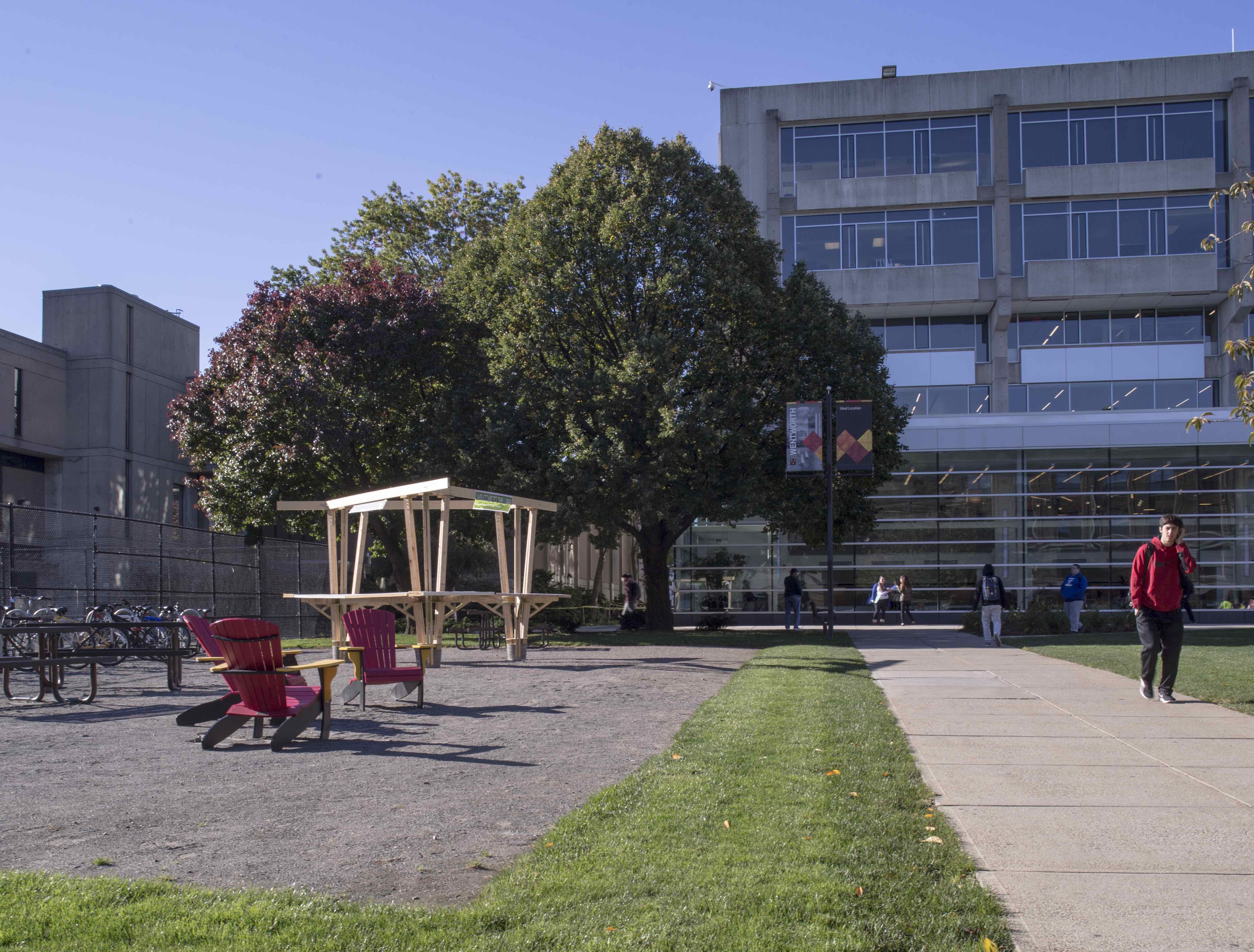
A curious triangular structure appeared on the Wentworth Quad a few weeks ago. The result of over a year and a half of brainstorming and design, backed primarily by a $500 COF Center for Sustainability student mini-grant, Peter Comeau, Nate Villemarie, Jason Hasko, and James Fan installed their E-bar in September. The prototype is a social outdoor space where students can work, charge devices, and utilize the structure as a meeting place. Built for less than $700 with repurposed or recycled materials, the goal was to create a communal environment that allows students to both socialize and collaborate. The team are all 4th year Architecture majors at Wentworth and used their passion for sustainable design to “jumpstart a conversation that Wentworth can build and create.”
The team sees the project as a teachable structure, inviting creativity and innovation to inspire other student projects. With the capacity to hold an entire person without budging, the team challenges other COF students to view the possibilities of the E-bar within their own majors or areas of discipline. One hope is to bridge the gap between majors taught at Wentworth and other COF majors by creating a system that allows the construction to be studied and taught to others.
Feedback so far from fellow students includes consideration of different surface heights, designing seating options, and adding a canopy on top. The E-bar presents an appealing outdoor gathering space; one the Wentworth Civil Engineering Club already took advantage of by hosting a recent meeting there. In the end, Hasko shared, “the team feels strongly the prototype is true to Wentworth’s mission of System, Integrity, and Honesty.”
A recent meeting with Provost Hansen, coupled with a working relationship with Chris Scanlon, Associate Director of The Center for Student Engagement, has the team excited about the possibility of rolling their project into the EPIC program. EPIC (Externally Collaborative Project-based Interdisciplinary Culture) is an experiential program emphasizing learning by doing through immersion and innovation. The team noted one benefit of the COF consortium is the future opportunity to work with other students in areas such as marketing and design. Initial conversations with MassArt students resulted in a connection with the ReStore, where the team sourced some initial prototype materials for free.
With the E-bar de-installation in a few days, future plans include a more permanent structure on Wentworth’s campus. Ideally, the team would love to see “E-bars all over the City of Boston!” Once dismantled, many of the materials will return to local vendors for reuse and the team is committed to breaking up the base to aggregate concrete for future use on campus. The goal is to repurpose nearly 100% of the structure. Comeau, Villemarie, Hasko, and Fan are already considering their next sustainable project and hope to apply for the upcoming round of COF Center for Sustainability student mini-grants. Hundreds of personal hours spent designing and constructing the E-bar resulted in the team all agreeing “at some point you have stop talking about the idea and start making things.”
To learn more about the E-bar, follow their story on Instagram #e__bar (two underscores). Contact Peter Comeau, comeaup1@wit.edu, with questions about the project or future collaborative opportunities. Faculty and staff are encouraged to direct students HERE to access the application for the next round of COF Center for Sustainability mini-grants. Deadline to apply is December 1.

